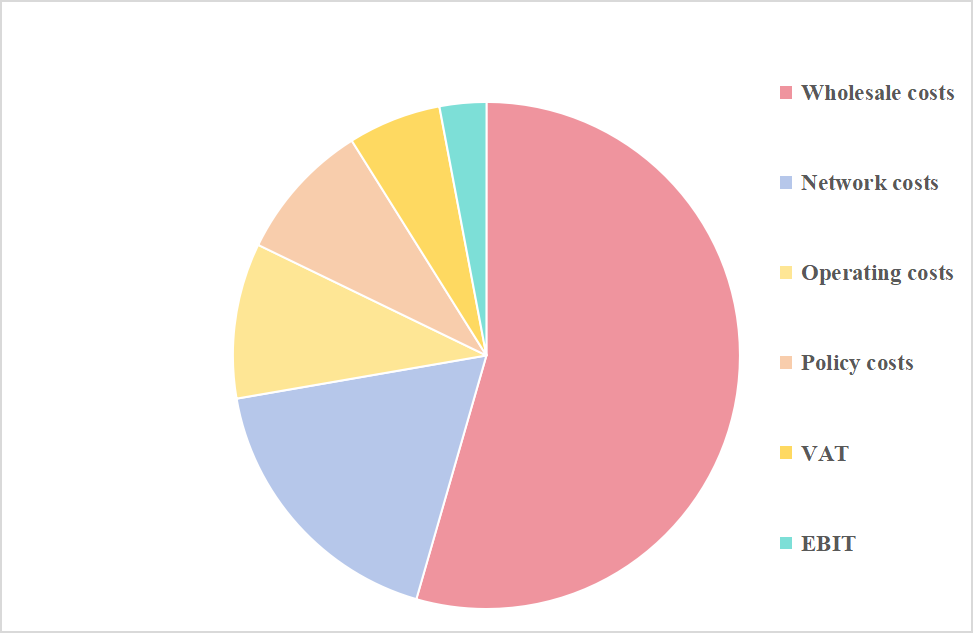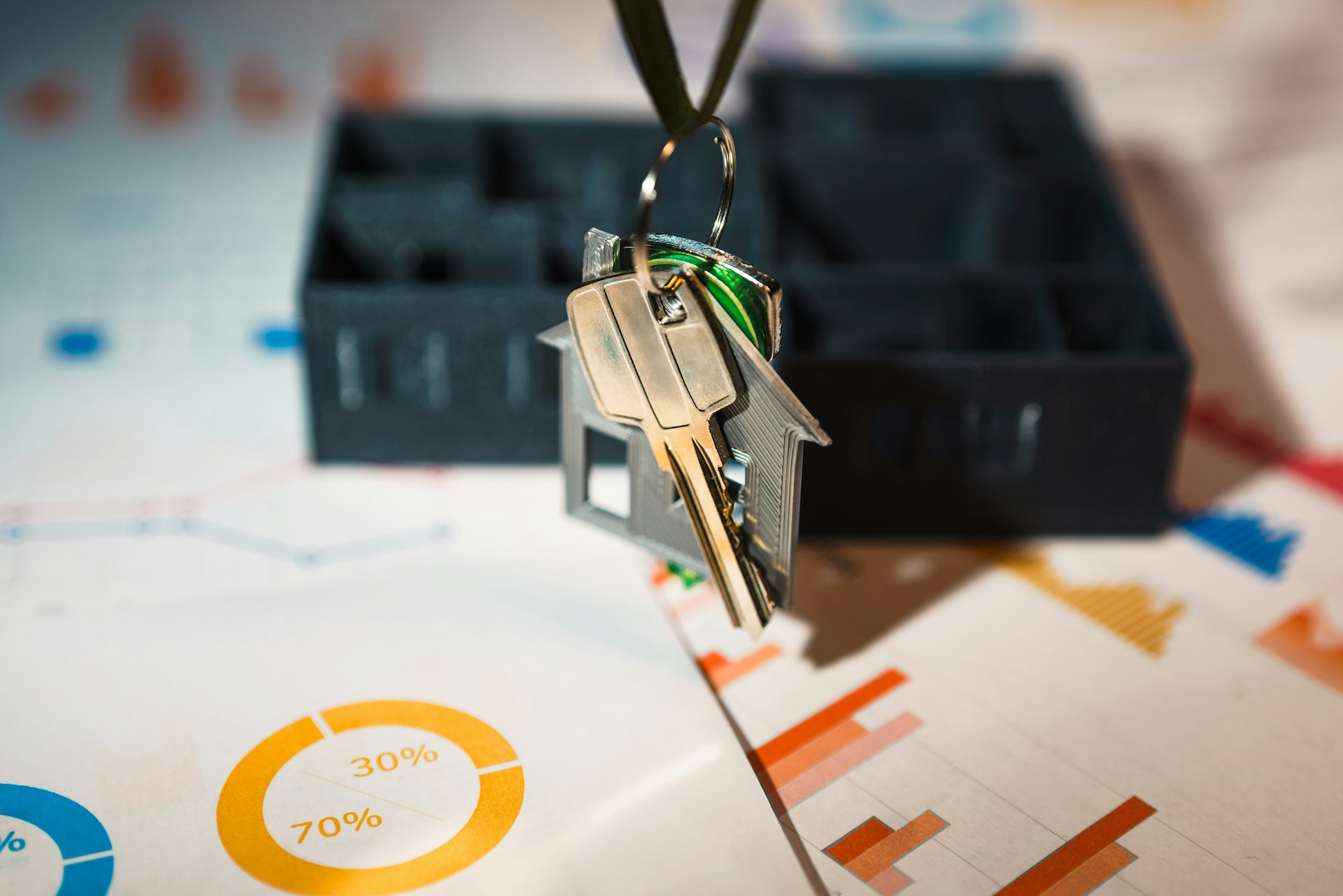What is the average gas and electric bill in the UK right now? Find out how much others are paying monthly for their energy and discover ways to cut your own bills.
In the United Kingdom, the average energy bill serves as a perennial concern for households across the country, reflecting both the impact of consumption habits and the broader economic landscape.
What makes up your average energy bills?
How much is electricity per month in UK? The most significant portion of your bill is your energy use. The more energy you consume, the more your energy provider will charge you per unit, or kilowatt hour (kWh), of gas or electricity.
The majority of your energy bill is made up of wholesale costs. Additional expenses include those related to the network, policy, and operating costs. The average gas and electric bill is already included.

Real-time Average Energy Bill in UK
The average annual energy bill in the UK is £1926.24.
The average monthly energy bill in the UK is £160.52.
No one wants to pay more for their energy than they need to. Having a rough idea of how much energy you should be using, and average energy costs may help you to keep track of your gas and electricity bills and compare prices with other energy providers.
What’s the average energy bill in UK by house size?
The price of energy fluctuates, and nobody can anticipate future rates with absolute precision. Depending on how much energy you consume, your actual bill may differ from the average.
| House Size | Average Annual Gas Bill (£) | Average Annual Electricity Bill (£) | Total Average Annual Energy Bill (£) |
|---|---|---|---|
| Small (1-2 beds) | £600 – £800 | £400 – £600 | £1,000 – £1,400 |
| Medium (3 beds) | £800 – £1,000 | £600 – £800 | £1,400 – £1,800 |
| Large (4+ beds) | £1,000 – £1,400 | £800 – £1,200 | £1,800 – £2,600 |
What’s the average energy bill in UK by region?
Average Energy bill in UK vary across major cities for a number of reasons, including different government regulations. The following table shows the differences in average energy bill in UK between cities.
| City | Average Gas Bill (per month) | Average Electricity Bill (per month) | Total Energy Bill (per month) |
|---|---|---|---|
| London | £70 – £135 | £80 – £155 | £150 – £290 |
| Birmingham | £65 – £135 | £75 – £145 | £140 – £280 |
| Glasgow | £55 – £110 | £65 – £125 | £120 – £235 |
| Liverpool | £65 – £135 | £75 – £145 | £140 – £280 |
| Bristol | £70 – £135 | £80 – £155 | £150 – £290 |
| Manchester | £65 – £135 | £75 – £145 | £140 – £280 |
| Edinburgh | £65 – £135 | £75 – £145 | £140 – £280 |
What’s the average electricity bill in the UK?
The average cost of annual electric bills in the UK is £964.80.
The average cost of monthly electric bills in the UK is £80.40.
How much is electricity per month? What is average household electricity usage? The average UK electric bill is based on Ofgem’s own definition of a ‘typical’ UK household, whose average electricity bill for 2 person household, containing 2-3 people. The normal monthly electricity bill is not surprising. During the April to July price cap period, prices should fall to 60.10p per day (daily standing charge) and 24.50p per kWh.
Direct Debit customers
| Electricity usage | Average annual consumption | Average annual cost* | Average monthly cost* |
|---|---|---|---|
| Low (flat or 1-bedroom house / 1-2 people) | 1,800 kWh | £621.88 | £51.82 |
| Medium (3-bedroom house / 2-3 people) | 2,700 kWh | £867.87 | £72.32 |
| High (5-bedroom house / 4-5 people) | 4,100 kWh | £1,180.94 | £98.41 |
Pay on receipt customers
| Electricity usage | Average annual consumption | Average annual cost | Average monthly cost |
|---|---|---|---|
| Low (flat or 1-bedroom house / 1-2 people) | 1,800 kWh | £664.12 | £55.34 |
| Medium (3-bedroom house / 2-3 people) | 2,900 kWh | £875.95 | £73.00 |
| High (5-bedroom house / 4-5 people) | 4,300 kWh | £1,205.46 | £100.45 |
What’s the average gas bill in the UK?
The average annual bill for UK gas cost is currently £961.44.
The average monthly bill for UK gas cost is currently £80.12.
What is average gas cost per month? This is again based on Ofgem’s definition of a ‘typical’ British household, a house with 2-3 bedrooms containing an average of 2.4 people. Average gas bill in the UK and average monthly gas cost still rise.
During the April to July price cap period, cost of gas in UK will fall and should be capped at 31.43p per day for the standing charge and 6.04p per kWh of gas consumed. Will gas prices in Great Britain still rise?
Direct Debit customers
| Gas usage | Average annual consumption | Average annual cost* | Average monthly cost* |
|---|---|---|---|
| Low (flat or 1-bedroom house / 1-2 people) | 7,500 kWh | £552.98 | £46.08 |
| Medium (3-bedroom house / 2-3 people) | 11,500 kWh | £772.15 | £64.35 |
| High (5-bedroom house / 4-5 people) | 17,000 kWh | £1,046.10 | £87.18 |
Pay on receipt customers
| Gas usage | Average annual consumption | Average annual cost | Average monthly cost |
|---|---|---|---|
| Low (flat or 1-bedroom house / 1-2 people) | 8,000 kWh | £560.96 | £46.75 |
| Medium (3-bedroom house / 2-3 people) | 12,000 kWh | £791.60 | £65.97 |
| High (5-bedroom house / 4-5 people) | 17,000 kWh | £1,108.74 | £92.40 |
How your average energy bill is calculated?
Unit rate
The unit rate in the context of average energy cost refers to the cost charged per unit of electricity or gas consumed by a household or business. The household electricity usage is certainly influenced by this.
Standing charge
The standing charge in the context of average energy cost is a fixed daily or monthly fee that energy suppliers charge consumers for the maintenance and upkeep of the energy supply infrastructure, regardless of the amount of energy consumed.
What influences the average energy bill in UK?
- Wholesale Markets: The prices of natural gas and electricity in the UK are heavily influenced by wholesale markets. Average monthly gas cost is influenced by this.
- Government Regulations: Energy policies and regulations set by the UK government can significantly affect energy prices. Gas prices in England may be influenced by this.
- Infrastructure Costs: Investments in energy infrastructure, such as building new power plants, upgrading transmission and distribution networks, and installing smart meters.
- Energy Efficiency: Average energy price has risen so fast recently. The energy efficiency of a home’s infrastructure and appliances is crucial. Everyone should pay attention to household electricity usage.
How to reduce your average energy bill?
- Energy-Efficient Appliances: Upgrading to energy-efficient appliances, such as refrigerators, washing machines, and dishwashers with high Energy Star ratings, can significantly reduce your energy bill.
- Home Insulation: Enhancing your home’s insulation and weatherization can reduce heating and cooling costs. Insulate walls, floors, and attics to minimize heat loss during winter and keep cool air inside during summer.
- Schedule: Installing a programmable or smart thermostat allows you to schedule heating and cooling based on your daily routine and adjust temperatures remotely.
- Energy-Efficient Lighting: Replace traditional incandescent bulbs with energy-efficient LED or CFL bulbs.
- Change of Habits: Simple changes in daily habits can contribute to energy savings. Turn off lights, appliances, and electronics when not in use. Use power strips to easily switch off multiple devices at once.
- Energy Audit: Conducting an energy audit can identify areas where your home is losing energy and recommend improvements.
- Finding Bill All Included House: uhome.com is a platform dedicated to providing high-quality student accommodation, in which utilities and bills are included. You can rent a comfortable and cheap house there.
Is there any support to help with average energy bill in UK?
- Cold Weather Payment: This is a government scheme that provides eligible individuals with a payment when the average temperature in their area is recorded as, or forecast to be, zero degrees Celsius or below over seven consecutive days.
- Warm Home Discount Scheme: This scheme provides a one-off discount on average household electricity usage bills between September and March.
- Energy Company Obligation (ECO): ECO is an energy efficiency scheme that obligates larger energy suppliers to fund measures that improve the energy efficiency of homes of low-income and vulnerable households.
Where can you check the average energy bill for a property?
Within a home’s Energy Performance Certificate, you’ll find an estimated average gas and electric bill for heating, lighting and hot water. It’s a calculation based on the property’s condition at the time of the assessment.
You’ll usually find a list of recommended home improvements within the certificate, too. Including how many points they’d likely add to your energy–efficiency score, as well as how much you could expect to save on your average gas and electric bill.
Conclusion
In this article, we mentioned how the average energy bill in the UK varies by house size and cities, why average electricity and gas bills in the UK are rising and how to save energy. Understanding your average energy bill is crucial to living in the UK, as it is a vital part of the cost of living, and it is great to save. In uhomes.com, you will find houses to rent which greatly cut your average electricity and gas costs.
FAQ
While it’s difficult to pinpoint an exact timeframe for when energy bills will come down, monitoring many factors such as Wholesale Energy Prices can provide insights into potential trends.
The unit price for average household electricity usage in the UK ranges from around 15 to 20 pence per kWh. The average unit price for gas in the UK is approximately 3 to 5 pence per kWh.
Average energy price is rising. In the UK, historically, gas cost in UK has been cheaper than electricity in terms of cost per kWh. However, it’s important to note that the relative cost of gas and electricity can vary depending on market conditions, tariff types and individual consumption patterns.
Energy prices in the UK increase due to factors such as volatile global wholesale energy markets, especially for natural gas, which influences electricity generation costs. Additionally, investments in infrastructure, environmental regulations, and currency fluctuations affecting imported energy costs also contribute to the overall increase in energy prices. Average gas and electric bill in UK is still rising.
Cheap renewable electricity can still be expensive on the wholesale market due to intermittency issues inherent in renewable sources like wind and solar. These sources generate electricity when weather conditions are favorable, leading to variable supply levels that may not always align with demand, thus affecting market prices.
A kilowatt-hour (kWh) is a unit of measurement used to quantify average energy cost. It represents the amount of energy used by a device or system operating at a power level of one kilowatt (1 kW) for one hour. Average gas bill in the UK is calculated by this.
A greener home is one that is more energy efficient to run, which means it uses less energy to perform the same task as a more inefficient home.
Homes with lower energy-efficiency ratings will require much more power to keep them warm, and well lit. Which is why they have higher average gas and electric bill, and higher carbon emissions, on average.
Your electric bill might be high due to increased usage from appliances like air conditioners or heaters during extreme weather, inefficient appliances, changes in household size or habits, higher utility rates, or potential issues like electrical leaks. Evaluating your recent usage patterns and appliance efficiency, as well as checking for any technical problems, could help identify the exact cause.








